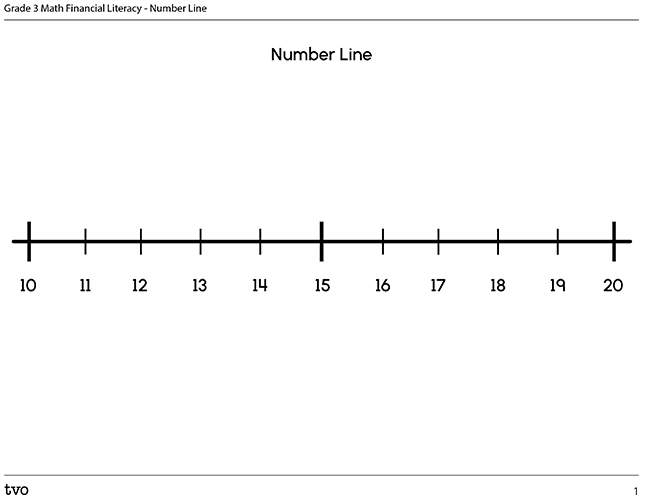Minds On
Guess the amount
An artist has between 10 and 20 dollars in their pocket. The amount is closer to 10 dollars. What might the amount be?
We can use a number line to solve this problem.
If the amount is closer to $10, the artist could have $11, $12, $13 or $14 in their pocket.
What if the money the artist had was closer to $20? What might the amount be?
Record your ideas using the following fillable and printable document “Number Line.” You can also record your ideas in your notebook or using another method of your choice.
When you are ready, press the ‘Answer’ button to reveal the solution.
If the amount of money the artist had in their pocket was closer to $20, they could have $16, $17, $18, or $19.
Let’s imagine that we wanted to round $23 to the nearest ten. When we round a dollar amount like $23 to the nearest ten dollars, we round the tens number to the nearest 10 dollars. To round $23 to the nearest ten, we can ask whether the number 23 is closer to 20 or 30.
Let’s explore this concept with the following number line.
In this lesson, we are going to learn to estimate dollar amounts by rounding to the nearest 10 dollars.
Action
Rounding money
We use rounding to determine dollar amounts to estimate how much items would cost.
Beach sale
A store is selling some beach items! The store is selling a fishing rod for $14, a beachball for $13, a rubber duck for $12, a tube for $16, and a pail for $13. Round the prices of the beach ball, fishing rod, and pail to the nearest ten dollars.

We can round the beach ball to $10, the fishing rod to $10 and the pail to $10. To buy these three items, we would need about $30.
Select three different items from the beach sale. Round the amounts to the nearest ten dollars and estimate the total cost.
Round the price of each of the five items to the nearest ten and estimate the total cost. Is the total cost greater or less than $70?
Hiking equipment sale
An outdoor hiking equipment store is having a sale! Select three items from the Hiking Shop and round each price to the nearest ten dollars. What is the cost of the three items after rounding?

About how much would all the items in the Hiking Shop window cost?
Round each of the prices to the nearest ten dollars and estimate the total cost of all the items.
Consolidation
Practice
Solve the following problems. You can record your answers using any method you prefer, but make sure you show your work.
Problem 1
A cyclist wants to purchase a new bicycle, helmet and a horn from a bike store. The bicycle is $34, the horn is $11, and the helmet is $13. About how much will the three items cost? The cyclist has $73. Will the cyclist have enough money to buy the items?

Problem 2
A painter wants to buy some art supplies. They have $25 to spend at the art store. They are interested in buying five items: an easel for $19, a paint tray for $11, a paintbrush for $1, a can of paint for $7, and a blending board for $4.
About how many art supplies could the painter buy? About how much money would the painter need to buy all five art supplies?

Discussion
Think about Problem 1 and Problem 2. Which was the most challenging question to solve? Why?
What strategy helped the most as you solved the questions?
Explain your thinking as you solve the question. Use pictures, words or numbers in your solution.
Reflection
How do you feel about what you have learned in this activity? Which of the next four sentences best matches how you are feeling about your learning? Press the button that is beside this sentence.
I feel...
Now, record your ideas about your feelings using a voice recorder, speech-to-text, or writing tool.
